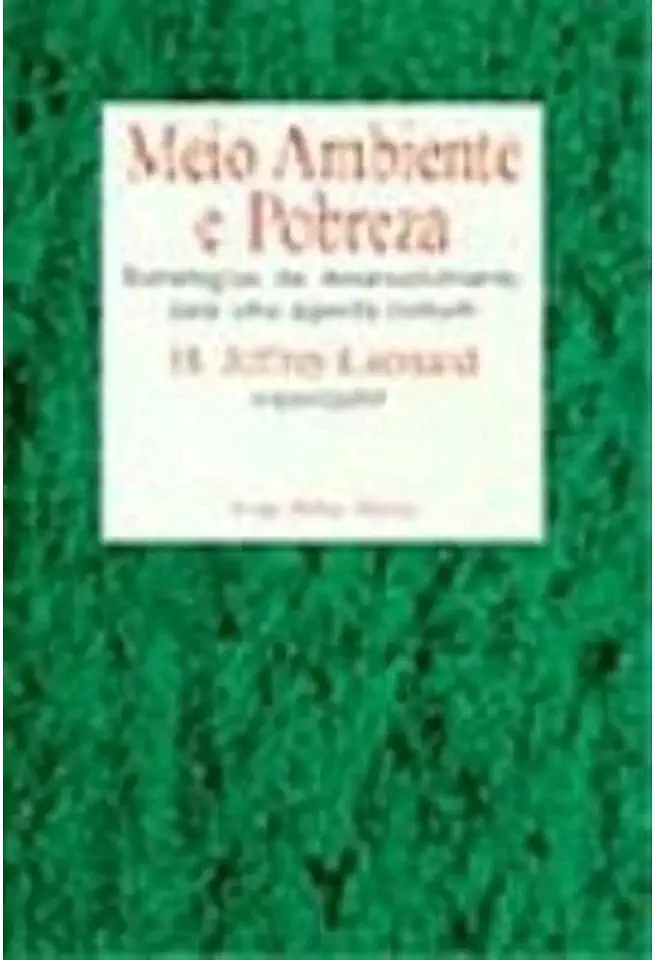
Environment and Poverty - H. Jeffrey Leonard
Environment and Poverty: A Framework for Understanding and Action
Introduction
In "Environment and Poverty," H. Jeffrey Leonard presents a comprehensive and thought-provoking analysis of the complex relationship between environmental degradation and poverty. Drawing on a wealth of research and case studies from around the world, Leonard argues that environmental degradation is not only a consequence of poverty, but also a cause. He demonstrates how environmental degradation can trap people in poverty by limiting their access to resources, reducing their productivity, and increasing their vulnerability to natural disasters.
Key Findings
Leonard's research reveals several key findings that challenge conventional wisdom about the environment and poverty. First, he finds that environmental degradation is not simply a problem of developing countries. In fact, some of the most severe environmental problems are found in wealthy countries. Second, he argues that environmental degradation is not only caused by population growth and economic development. In many cases, it is also caused by unsustainable policies and practices, such as deforestation, overgrazing, and pollution. Third, Leonard finds that environmental degradation can have a devastating impact on human health, particularly among the poor.
A Framework for Action
Based on his findings, Leonard proposes a framework for action to address the complex relationship between environment and poverty. He argues that we need to move beyond traditional approaches that focus solely on economic growth and environmental protection. Instead, we need to adopt a more holistic approach that integrates environmental sustainability, social justice, and economic development.
Leonard's framework for action includes several key elements:
- Promote sustainable agriculture: We need to support farmers in adopting sustainable agricultural practices that protect the environment and improve food security.
- Invest in renewable energy: We need to transition to renewable energy sources, such as solar and wind power, to reduce our reliance on fossil fuels and mitigate climate change.
- Protect forests: We need to protect forests from deforestation and degradation, as they play a vital role in regulating the climate, providing habitat for wildlife, and supporting livelihoods.
- Reduce pollution: We need to reduce pollution from industrial activities, vehicles, and agriculture to improve air quality, water quality, and human health.
- Promote education and empowerment: We need to invest in education and empower communities to participate in decision-making processes that affect their environment and livelihoods.
Conclusion
"Environment and Poverty" is a must-read for anyone interested in understanding the complex relationship between environmental degradation and poverty. Leonard's comprehensive analysis and framework for action provide a valuable resource for policymakers, practitioners, and researchers working to address these critical issues.
Why You Should Buy This Book
"Environment and Poverty" is a powerful and persuasive book that will change the way you think about the environment and poverty. It is a must-read for anyone who cares about the future of our planet and the well-being of its people.
Here are a few reasons why you should buy this book:
- It is based on solid research and evidence. Leonard draws on a wealth of research and case studies from around the world to support his arguments.
- It is written in a clear and accessible style. Leonard's writing is clear, concise, and engaging, making the book easy to read and understand.
- It offers a comprehensive framework for action. Leonard's framework for action provides a roadmap for policymakers, practitioners, and researchers working to address the complex relationship between environment and poverty.
- It is a call to action. Leonard's book is a wake-up call to the urgent need to address environmental degradation and poverty. It is a must-read for anyone who wants to make a difference in the world.